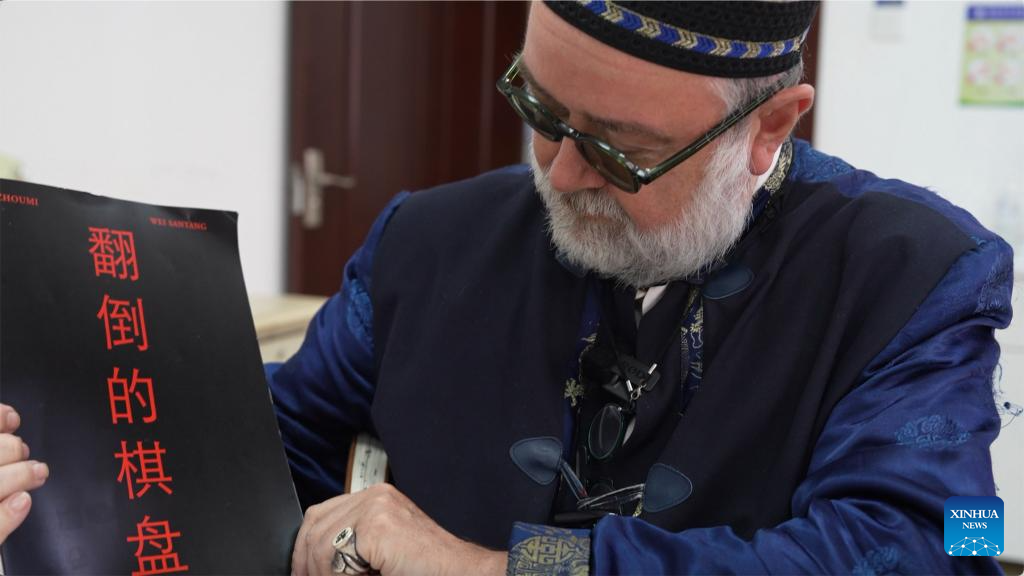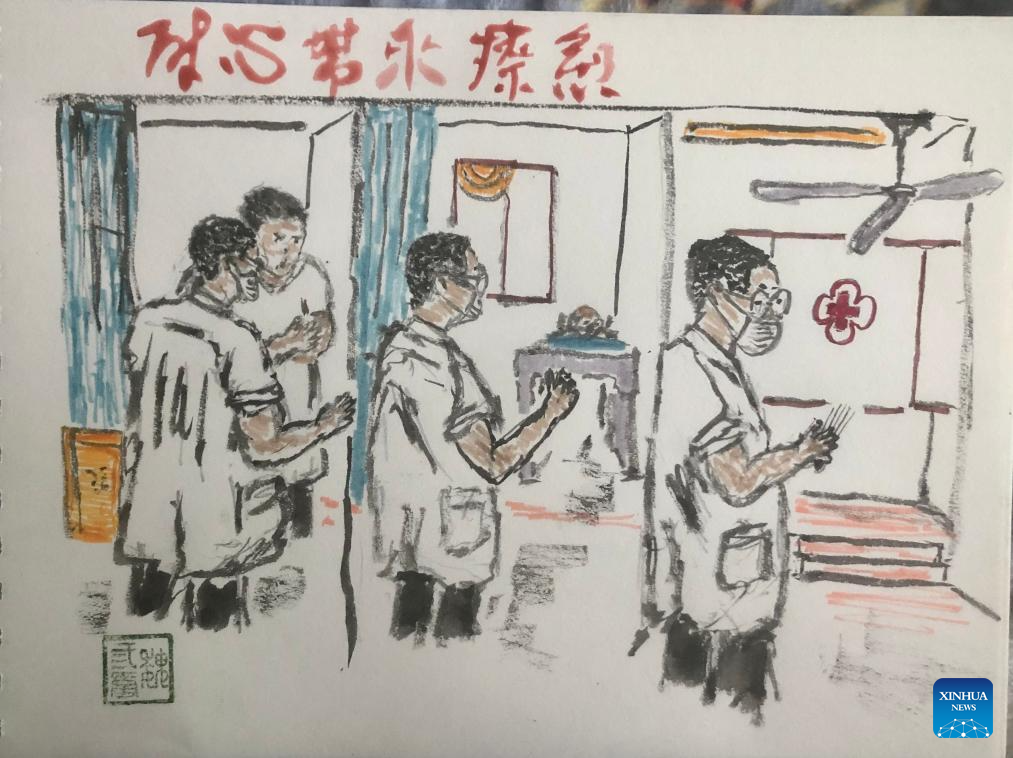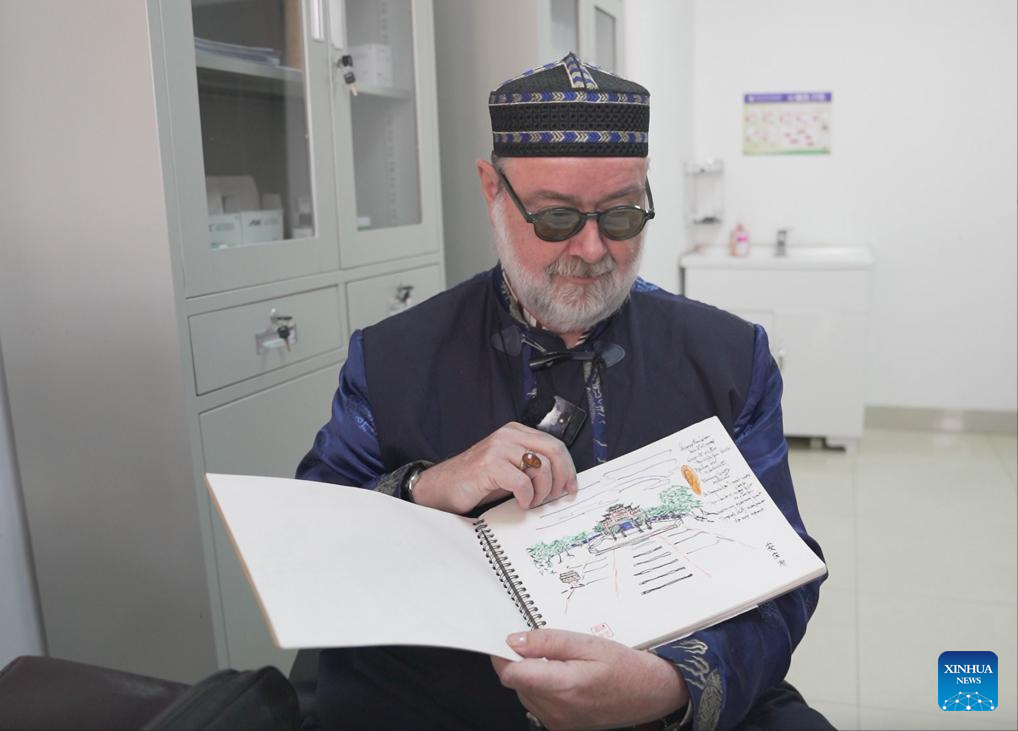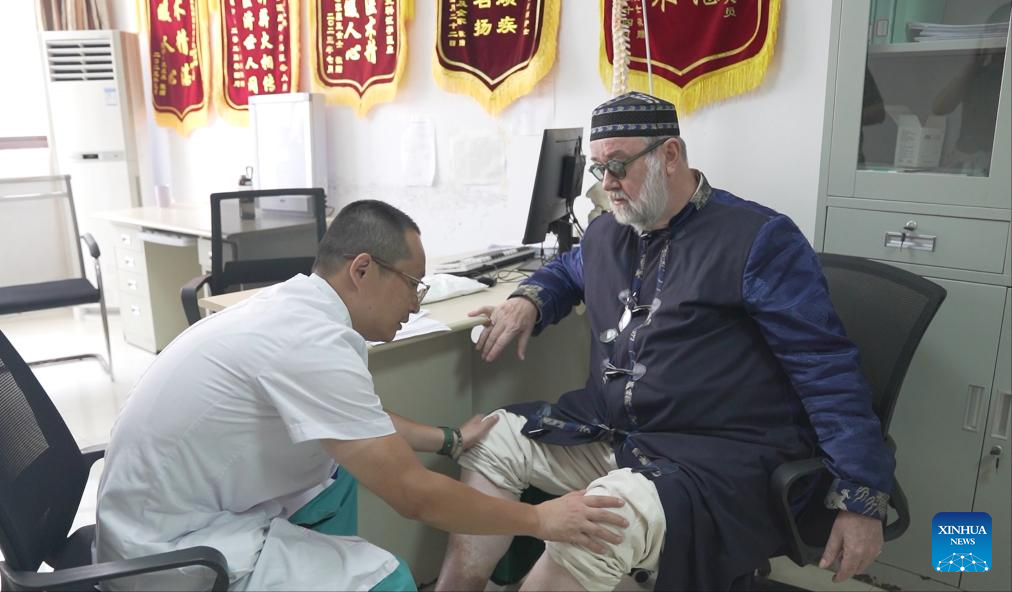Feature: German scholar's varied, inspirational journey of body, mind renewal in China
Source: Xinhua
Editor: huaxia
2025-08-17 11:02:00

Thomas Wilkinson shows his English-language Huangmei opera script "Overturned Chessboard" in Anqing City, east China's Anhui Province, July 10, 2025. (Xinhua/He Xiyue)
HEFEI, Aug. 17 (Xinhua) -- On a humid summer afternoon in the city of Anqing, east China's Anhui Province, a tall man in a flowing silk robe strolled through narrow streets lined with low brick houses.
Shopkeepers called out friendly greetings as he passed. He stopped to exchange a few words. His easy smile and measured Mandarin, unusual for a foreigner, have made him a familiar and welcome presence in this city on the banks of the Yangtze River.
This man is Thomas Wilkinson, a German scholar known in China as Wei Santang. Born in the United States and having lived in the UK, Germany and Portugal, he has long been searching for a place he could truly call home. Now 62, he believes he may have found it in Anqing -- the birthplace of Huangmei opera.
Wei's early encounters with China were unplanned. As a college student, he was first exposed to Chinese culture through a roommate who was deeply passionate about it.
Later, he lived in New York's Chinatown, and in 1997 he traveled to Nanjing, located in east China's Jiangsu Province, at his brother-in-law's invitation to work as a consultant.
"These things weren't planned, but they kept happening by chance. I think perhaps it was fate speaking to me -- that my life was meant to bring me to China and leave a mark on this land," Wei said.
Wei first seriously considered working in China after attending an academic conference in the Macao Special Administrative Region in south China in 2019.
One year later, he secured a position at a university in Anhui. Though he never relocated there due to various reasons, he forged a lasting friendship with a colleague from across the globe -- with the two working together on a poetry and painting collection inspired by the Chinese solar terms.
In the summer of 2024, as a scholar with the Centre for African Studies of the University of Porto in Portugal, Wei traveled to China, visiting five cities in 15 days. One of his stops was Anqing.
"I had watched a documentary on Huangmei opera and learned about Anqing as the city of Huangmei opera. I watched it several times and felt a strong curiosity and affection for this city I had never seen," Wei said.
During his trip to China, he injured his arm while moving luggage. Having experience with traditional Chinese medicine in Portugal and other countries, he went to a local traditional Chinese medicine hospital to seek treatment.
"It was raining that day, and I met Wei Santang in the clinic just before we were about to leave," recalled Lu Jun, a senior doctor at the hospital's rehabilitation medicine center.
Wei mentioned symptoms of lateral epicondylitis and cervical spondylosis, but Lu also noticed swelling in his legs -- a sign of possible underlying problems.
"If he had stayed longer, I could have helped him improve his overall health," Lu said. "Since he had to return to Portugal soon, we exchanged contact information."
Lu later provided Wei with a weight management diet plan and remotely advised a local acupuncturist on treatment.
"Even though we were thousands of miles apart, Dr. Lu always patiently answered my questions. With the diet plan he provided, I lost 17 kilograms without dieting. His detailed analysis and reasoning strengthened my confidence in traditional Chinese medicine," Wei said.
When he planned his return to China this year, arranging a follow-up visit to Anqing was his first priority.
This summer, Wei returned with the intention of turning a short visit into a longer stay. Instead of booking into a hotel, he rented a house in the city -- immersing himself in local life.
Anqing welcomed him warmly in return. Residents gradually grew accustomed to this foreigner dressed in traditional Chinese silk robes. On the streets, people often greeted him, asking: "How's your leg?" Wei felt he had finally found a place to call home.
With such a sense of belonging, the summer became productive. Along the Yangtze River, he sought inspiration, created brush-and-ink paintings, and composed poems for the city -- work that soon fed into an idea for an English-language Huangmei opera.
Huangmei opera, one of China's five major traditional opera forms, is often called "China's rural music." Its melodies are smooth and lyrical, known for bright, expressive storytelling.
Building on the tradition, Wei spent this summer working with renowned Huangmei opera playwright Zhou Mi, who is also an associate professor at Anqing Normal University, collaborating on an English-language script about a romance between an American naval officer and a Huangmei opera performer.
"The singing style and storytelling of Huangmei opera can be expressed in other languages. If presented in English, it can open a window for those who understand English but not Chinese," Wei said.
Wei first writes in English, after which they refine the lyrics together and set them to music -- aiming to blend the language seamlessly with Huangmei opera melodies. The project is expected to be completed by the end of the year.
"This innovative blend allows the world to see Huangmei opera while encouraging us to rethink tradition with an open mind and explore broader performance possibilities," Zhou said.
Wei's cross-cultural work in Huangmei opera and traditional Chinese medicine reflects a larger pattern in which traditional Chinese culture is reaching audiences beyond China.
China's distinctive cultural practices are being shared worldwide through performances, academic exchange and digital platforms -- allowing global audiences to experience their artistic and therapeutic value.
"I hope to expand this compact, easily staged form of opera out of China. It's a small ambition of mine -- to contribute in a small way to the wider dissemination of Huangmei opera. China is an amazing country, full of astonishing things," Wei said. ■

This file photo shows a painting with the words "Patience Brings Healing" written in Chinese that Thomas Wilkinson created for a local traditional Chinese medicine hospital in Anqing City, east China's Anhui Province. (Xinhua)

Thomas Wilkinson shows a painting he created for Anqing in Anqing City, east China's Anhui Province, July 10, 2025. (Xinhua)

Lu Jun (L), a deputy director of the rehabilitation medicine center of a local traditional Chinese medicine hospital, provides treatment for Thomas Wilkinson in Anqing City, east China's Anhui Province, July 10, 2025. (Xinhua)



